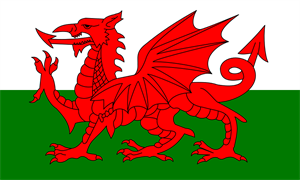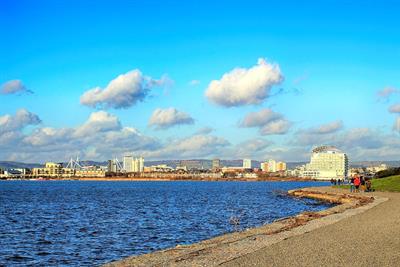Read, listen and learn or repeat some words and expressions about Wales.
(Lasi, klausies un iemācies vai atkārto dažus vārdus par Velsu!)

Beige (bēša) colour on the map.
- Wales
Wales is a country that is part of the United Kingdom. It is bordered by England to the east, the Irish Sea to the north and west, and the Bristol Channel to the south.
Wales — [weɪlz] — Velsa
- The flag of Wales

The Flag of Wales consists of a red dragon passant on a green and white field. The flag incorporates the red dragon of Cadwaladr, King of Gwynedd, along with the Tudor colours of green and white. It was used by Henry VII at the Battle of Bosworth in 1485, after which it was carried in state to St Paul's Cathedral. The red dragon was then included as a supporter of the Tudor royal arms to signify their Welsh descent. It was officially recognised as the Welsh national flag in 1959.
the flag of Wales — [ˌflæɡ əv ˈskɒt.lənd] — Velsas karogs
- Cardiff
Cardiff is the capital of Wales and its largest city. The eleventh-largest city in the United Kingdom, it is Wales' chief commercial centre, the base for most national cultural institutions and Welsh media, and the seat of the National Assembly for Wales.
Cardiff is the county town of the historic county of Glamorgan. A small town until the early 19th century, its prominence as a major port for the transport of coal following the arrival of industry in the region contributed to its rise as a major city. In 1905, Cardiff was made a city and proclaimed the capital of Wales in 1955.

Cardiff — [ˈkɑː.dɪf] — Kārdifa
- Nationality
Welsh national identity emerged among the Britons after the Roman withdrawal from Britain in the 5th century, and Wales is regarded as one of the modern Celtic nations. The origin of the "Welsh nation" can be traced to the late 4th and early 5th centuries, following the end of Roman rule in Britain.
The names "Wales" and "Welsh" are modern descendants of the Anglo-Saxon word "wealh", which was derived from the name of the Gaulish people known to the Romans as "Volcae" and which came to refer to inhabitants of the Western Roman Empire.
Welshman — [ˈwelʃ.mən] — velsietis
Welshwoman — [ˈwelʃ.wʊm.ən] — velsiete
the Welsh — [welʃ] — velsieši
The modern Welsh name for themselves (plural) is Cymry (singular: Cymro), and Cymru (all words are pronounced as [ˈkəm.rɨ]) is the Welsh name for Wales. These words are descended from the Brythonic word "combrogi", meaning "fellow-countrymen".
- Language
Welsh is a Brittonic language of the Celtic language family. It is spoken natively in Wales. The language of the Welsh developed from the language of Britons.
Welsh — [welʃ] — velsiešu valoda
Atsauce:
https://www.visitwales.com/